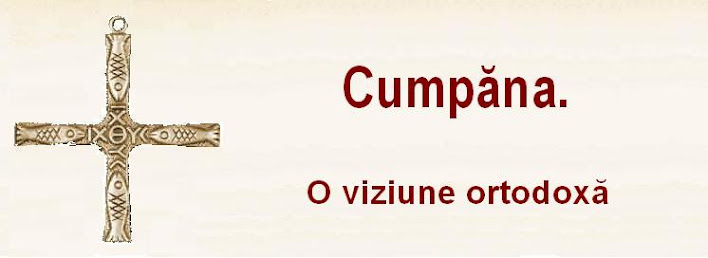Nu mi se pare deloc surprinzător că un transsexual a devenit călugăr în Biserica Catolică (https://www.activenews.ro/cultura-biserica-ortodoxa/Sihastrie-si-Dramaturgie-Un-calugar-catolic-american-a-dezvaluit-ca-este-Transsexual-%E2%80%93-El-este-pustnic-la-un-teatru-189774). Mai degrabă, mi se pare curios că le-a luat atît de mult timp. Este important să înțelegem însă că aici nu mai este vorba despre pedofilie și homosexualitate, adică despre perversiuni tradiționale din catolicism, ci despre o nouă înțelegere a chemării și misiunii creștine. Este vorba despre o nouă școală de gîndire, pretins creștină, care operează cu succes și în România post-comunistă, după cum a demonstrat-o ușurința cu care reprezentanții ei au anulat în 2018 responsabilitatea pentru familie și normalitate. Intelectualii „sofianici” din România au profitat de autoritatea lor, dobîndită mai ales cu ajutorul unor lideri ortodocși, pentru a bloca apelul la antropologia teologică ortodoxă prin cîteva silogisme pe cît de ingenioase, pe atît de perverse: prin trimiterea la misterul naturii divine și al celei umane, prin manipularea înțelegerii iubirii omenești și a iubirii lui Dumnezeu și prin revendicarea Bisericii pentru toți cei care doreau o Biserică ca afară, prin manipularea intimității persoanei, în sensul că Dumnezeu o respectă oricum ar fi persoana respectivă. Ceea ce este desigur adevărat. Dar faptul că Dumnezeu ne respectă și nu intră cu forța în sufletul nostru reprezintă nu doar o asigurare suficientă pentru toți cei rătăciți cu privire la faptul că Dumnezeu nu va intra în nici un alt fel, ci și o încurajare pentru a-și găsi un dumnezeu care să le convină.
Susținătorii catolici ai LGBTQ+ văd această alegere ca pe un răspuns la alegerea lui Dumnezeu, alegere față de care Biserica trebuie să fie receptivă, manifestîndu-și astfel vocația. Nu mai este vorba aici despre o deviere sexuală, ci despre o nouă formă de împlinire umană. Din perspectivă conservatoare, această interpretare ține însă de o formă de deviere mistică, care determină și justifică devierile comportamentale corespunzătoare. De pildă, Matson pretinde că într-un sens „tranziția” de la femeie la bărbat a ajutat-o să înțeleagă mai bine structura gîndirii catolice și transsubstanțierea din Euharistie:
As for ever leaving Catholicism itself, Matson bristled at the idea, calling the church “my family.” “I’m Catholic,” he said. “I became Catholic after I transitioned because of the Catholic understanding – the sacramental understanding – of the body, of creation, of the desirability of the visible unity of the church and primarily because of the Eucharist.”
At the very least, Matson said, he hopes going public will spark dialogue about his fellow transgender Catholics, a discussion he believes can enhance unity among the body of believers.
“You’ve got to deal with us, because God has called us into this church,” he said. “It’s not your church to kick us out of – this is God’s church, and God has called us and engrafted us into it.” (https://religionnews.com/2024/05/19/catholic-diocesan-hermit-approved-by-kentucky-bishop-comes-out-as-transgender/).
Menționez în continuare alte cîteva manifestări catolice în favoarea afirmării identităților sexuale și de gen, care să ne ajute să ne pregătim cît de cît pentru viitoarea ortodoxie incluzivă manifestată deja în România cu ocazia referendumului pentru familie:
„DignityUSA works for respect and justice for people of all sexual orientations, genders, and gender identities – especially gay, lesbian, bisexual, transgender, queer, asexual and intersex persons – in the Catholic Church and the world through education, advocacy, and support.” (https://www.dignityusa.org/)
„Beloved by God. A Declaration of a Catholic Commitment to Trans-Affirmation
As Catholics, we firmly believe our transgender and nonbinary community members are beloved by God. We recognize that these individuals are living into the dream God had for them long before their birth. Their unique gifts remind us that God's love is dynamic and transformative. We feel called to openly state our support for this marginalized community during these times when they are increasingly faced with violence and criticism for their identities and experiences. We pledge to make an open commitment to supporting justice, equity, and affirmation for transgender and nonbinary individuals throughout the Catholic Church and the world.” (https://belovedbygod.faith/#five)
„As members of the body of Christ, we cannot be whole without the full inclusion of transgender, nonbinary, and gender-expansive individuals.” (https://cssjfed.org/2023/03/31/vowed-catholic-religious-honor-trans-day-of-visibility/)
„Earlier this month, former House Speaker Nancy Pelosi recalled when U.S. bishops came out against the Affordable Care Act in 2010, a move that concerned some Catholic Democrats who wanted to vote for the bill. But a broad group of Catholic nuns voiced support for the ACA a short time later, a development Pelosi credited with helping get the bill passed, saying, “Thank God for the nuns.”
But the nuns’ activism was not without consequence. Their support for the ACA is widely believed to be one catalyst for a Vatican investigation of women religious in the U.S. The investigation, launched under former Pope Benedict XVI, was discontinued by Pope Francis in 2015.” (https://religionnews.com/2023/03/31/letter-representing-thousands-of-catholic-nuns-declares-trans-people-beloved-and-cherished-by-god/)
„A coalition led by Catholic nuns, representing thousands of women religious and associates at partner groups, released a public letter on Friday (March 31) voicing support for transgender, nonbinary and gender-expansive individuals, declaring they “are beloved and cherished by God” and implicitly rebuking recent statements from the U.S. Catholic hierarchy.
The letter is meant to mark the International Day of Transgender Visibility, which takes place Friday.
The nuns’ effort comes in the wake of a doctrinal statement published earlier this month by a committee of the U.S. Conference of Catholic Bishops, which discouraged Catholic health care groups from performing various gender-affirming medical procedures, arguing doing so does not respect the “intrinsic unity of body and soul.” Sister Barbara Battista, the congregation justice promoter for the Sisters of Providence, St. Mary-of-the-Woods, noted the letter was already in the works before the bishops unveiled their doctrinal statement. She described her work as “participating in the healing ministry of Jesus,” rooted, she said, in a “sacred trust” between patients and providers.
But Catholic leaders and government officials, she argued, have tried to “insert themselves into the private, very personal and intimate conversations and decisions made between the health care provider and the person they are serving.”
